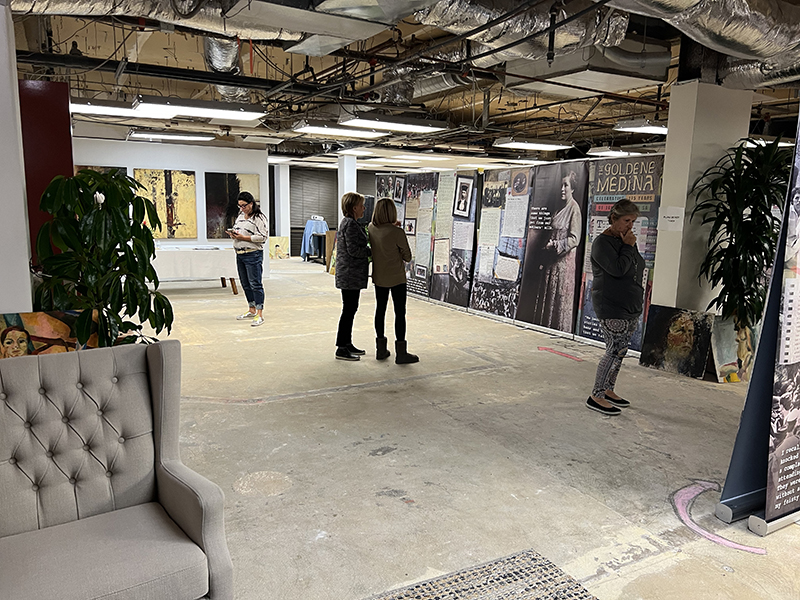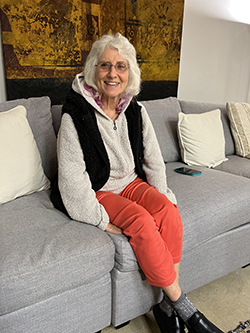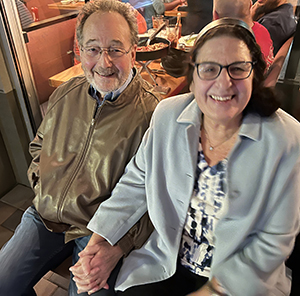
By Donald H. Harrison


SAN DIEGO – After today (Sunday, Nov. 20), there are six more dates that people may sign up to see “The Goldene Medina,” a free exhibit in La Jolla about South African Jewish life between 1841 and 2016 that is sponsored by the South African Jewish American Community (SAJAC). To attend before the exhibit closes Tuesday Nov. 29, one must register via www.sajac.com . At that time, the address will be provided.
SAJAC President Pamela Nathan said the exhibit was created by the South African Jewish Museum, located in Cape Town. She said she hopes that American-born visitors to the exhibit “will get a slice of South African Jewish life.” For members of San Diego’s sizeable South African Jewish community, “it is nostalgic because we grew up in it, but I am hoping that the children will be here because it is their heritage, their history. When I make calls, I say ‘bring the kids, bring the kids.’”
My wife Nancy and I attended with two South African expatriates, Dr. Annette Feigenbaum and her husband Norman Kort. After viewing videos and more than 30 panels that mix anecdotes with history, the couple related what had resonated with them.
“For me the ones (panels) about camp (machaneh) really brought back memories, very nostalgic,” Kort said. “The only reason I knew it was around the time I had gone was that one of the signs had ’63-’64 in fire lights, and that was my last year. I was a madrich (counselor) taking care of little ones.”
On the panel, an unidentified South African wrote about camping in December (which is summer in the southern hemisphere): “Three weeks with almost no adults led by 19 and 20-year-old kids. We’d wake up, go to the beach, and wrestle with big ideological questions. Should we live in Israel? What is morally right and wrong? Who should be our girlfriend? … When the big day would arrive, we’d take the slow train from Johannesburg to Cape Town crossing the Karoo on a 20-hour ride. Nobody slept. It was known as the party train. At least one in every six of the boys brought a boom box and everyone would have premiered Pop Shop and Now Music.”

Kort said he was in charge of a group of six younger boys. “The madrichim would get together when the kids were supposedly asleep. We would have camp fires and songs and plan for the next day. On the way back, as I walked past the tent of my kids, I heard whisper, whisper and giggles and laughs, so I ripped open the tent and boys and girls scattered. They were playing Spin the Bottle. The girls had come in.” On another occasion, the children asked Kort to tell them a story before they went to bed. He told a ghost story, which ended with a surprise of him yelling the scary bit, “and it took them a long time after that to fall asleep.”
Feigenbaum said her parents would not permit her to go to the summer camp because “it was on the beach, in tents, in summer, and everyone was in skimpy dress, and I did not go.” However, she was permitted to go the seminar in winter where “lots of things happened as well, but somehow the perception was that camp was a lot wilder.”
She also recalled going to “boarding schools in the middle of nowhere with Habonim groups, and we would have activities day and night with a lot of Zionist talk and a lot of singing and bonding and team building, a good growth experience. It was boys and girls together.”
It was a long train ride from Cape Town to the Transvaal (a province renamed after the apartheid regime of South Africa fell and the country was democratized). Returning home, “I remember hanging out of the window coming into the station singing ‘We Shall Overcome.’”
Attendee Beryl Youngleson commented that she enjoyed reading several panels mentioning Nelson Mandela, the country’s first Black president from 1994 to 1999 after the previous apartheid regime fell.
In one panel, a man reminisced that while voting in the election that brought Mandela to power, an elderly Jewish acquaintance caught hold of his arm and asked “What brachah (blessing) shall I make.” He said he responded, “Shehecheyanu, the blessing over new things. “After more than 300 years of white domination, the new South Africa had been born.”
Another person wrote: “Lying on the lawns of the Union buildings watching Mandela take the oath of office was a mixture of ecstasy and relief. I had been so sleep deprived during the chaos of our first democratic election that at one point I fell asleep. I will however never forget the flyover by the South African National Defense Force trailing the new South African flag – for at that moment, for the first time in my life, I felt proud to be a South African.”
In one panel was a story labeled “A Surprise Guest.” It read: “What is the epitome of Jewish chutzpah? (colossal nerve). Inviting the president of the country to attend your bar mitzvah. And what is Jewish mazel (luck). When the president actually accepts. The bar mitzvah boy delivered his handwritten note to a security guard outside Mandela’s Houghton estate. He hoped to get a card from Mandela in return. Instead, his parents receive an official call to say the president will attend. On the day, President Mandela arrived and sat at the main table, between the bar mitzvah boy and his father. Mandela went on to receive hundreds of handwritten invitations to bar mitzvahs in the year to come.”
Some of my own favorite panels dealt with Yiddishkeit. For example, one told the story of a Yiddishe grandmother going every Saturday afternoon to the movie matinee. In order to not break the prohibition against spending money on Shabbat, she purchased her ticket on a Friday. A friend scolded her that she was “twisting the law,” but granny wasn’t intimidated. “What she did, though, was to make sure she went to the toilet at home before the matinee, so that she did not have to tear any paper.”
A story from the late 19th century told of a clergyman arriving in South Africa from Europe. “They asked me to cut my beard and my long hair saying, ‘Your honor, you are not in Lithuania any more. Over there they will not look at the clothes of the cantor and the reverend. The weightier the clothes and the longer the payot (side curls), the more honor would be given the person, but in Africa, the very honored ladies will look at the reverend with seven eyes and if they do not like him, all of this will come to nothing and to naught.”
Another story, which I judged to have occurred perhaps in the 1920s, related that “my bobba (grandmother) was a seamstress. Every year we got two new outfits each—one for Pesach and one for Rosh Hashanah.”
Blacks were not the only people subjected to prejudice in South Africa. Another anecdote told of a 90th birthday party for Solly, who often played chess with the dominee (clergyman) of the Dutch Reformed Church. In a short speech about Solly, the dominee said “Oom (Uncle) Solly is a man of the Book. He is from the people of Abraham, Isaac, and Jacob. I did not know Oom Solly as a young man so I asked people what sort of man he was and they told me Oom Solly was a good man, he wasn’t a crooked Jew.”
Language difficulties may have contributed to some misunderstandings. There is the story of the shochet (kosher slaughterer) who was dispatched to Zimbabwe in 1980, shortly after that country became independent. A guard at the border asked the man with long beard and black coat what his purpose was in Zimbabwe. In his Lithuanian-accented, broken English, he replied, “I’ve come to kill for ze Jews.”
There were charming stories of understanding between disparate peoples. One woman wrote: “’Your people are my people and your G-d is my G-d …’ I first recited these words an an 8-year-old colored, Protestant schoolgirl when my class reenacted the story of Ruth. Years later I would repeat those same words as part of my conversion to Orthodox Judaism.”
Another story was about the Muizenberg beach in the Cape Town area, which was often crowded by Jewish families lathered in lotion: “There was a fresh fruit seller, a Cape Malay fellow who spoke perfect Yiddish.”
There also was an anecdote about a grandmother who would “prepare a hot midday meal full of goodness—either a stew, or braised chicken, or meat with vegetables” for herself and for Lizzie, her domestic help. “She would see that Lizzie was seated at the kitchen table so that granny could serve it to her. Having arrived as a poor immigrant, I don’t think she ever got over the guilt of having domestic help.”
*
Donald H. Harrison is editor of San Diego Jewish World. He may be contacted via donald.harrison@sdjewishworld.com